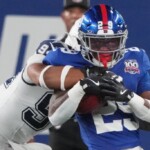My only conversation with Pete Rose came in the early 1980s, when he was with the Phillies. And he started it.
It was early April, a Friday night, and the Phils were to be on NBC’s “Game of the Week,” the next day. Some NBC public relations fellows were driving down to Philly for the game and asked if I’d like to join them.
With our red media field-access credentials dangling from our belts, we watched batting practice from behind the cage. When Rose finished his swings, he walked over, eyed the press passes, then began to speak. Boy, did he.
He asked if we’d watched the just-concluded NCAA basketball tournament. I said I had. And off he went.
He said he took a beating, especially late in games “by missed free throws.” Geez, Pete, geez. Could he be any less discreet with a stranger, especially a newspaper guy?
But on he went. He wanted to talk; he needed to talk. He was obviously buzzed, presumably by the amphetamines he was widely suspected to ingest to keep him cranking into his 40’s.
I recognized his wide-eyed inability to cease talking and stand still from my college days when many of us popped “black beauties” to study during finals. They didn’t help us study as much as they kept us talking to one another until past dawn.
Anyway, Pete apparently lost a bundle betting on the NCAA tournament and he felt the compulsion to share that with somebody. Anybody. In this case, me. Then again, sports gamblers become delusional in thinking that everyone in their purview bets.
I walked away stunned, disbelieving, disturbed.
In his books about the seedy sports autograph business, “Sign This,” and “Sign This #2,” author Tom Bunevich, a former card show promoter, identifies Rose as his fallen former favorite player and as among the most difficult superstars to endure.
“He has always been a draw at shows. His appearances are all business. … It’s head down, do the next one, keep moving. … Somehow he always notices the good-looking women and exchanges conversation with them. He can offer a serious comment, then follow it with an off-color, off-the-wall remark. Rough language comes easily. …
“We like our heroes a little humble. Pete Rose is far from that.”
Bunevich also details what became conspicuously ugly to card show customers. Rose demanded that a TV be set by his side so he could track his sports gambling action while signing.
The last time I saw Rose in person, he was seated at a table for two in Tampa’s Bern’s Steak House. I was with my wife and kids.
Rose, by then well into his 60’s, was with a young female, who looked no older than 18. I figured she was his granddaughter — until they started holding hands and playing under-the-table footsie.
By 2017, Rose was denying public accusations of statutory rape with a girl in her mid-teens. Those wearing Rose-colored glasses had more to combat or ignore.
Since Rose passed this week, at 83, a renewed call to induct him into the Hall of Fame has risen. Cited as a legitimate rationalization is MLB’s current addiction to business-partnered, scandals-guaranteeing gambling. I get that and don’t fully disagree.
But aside from the gambling, girls and drugs, I wouldn’t vote for Rose on the grounds of character. He had none.
Airing F-bomb par for the curse
Sunday, after walking a batter, Yankee Clarke Schmidt was heard to holler the F-word. YES replayed the obscenity, audio included. Michael Kay: “We apologize for that language here on a Sunday.”
But then why did YES replay it with audio, then replay it again without, in case anyone missed it the first two times?
NBC’s Presidents Cup coverage included a promo for “The Voice,” now including Snoop Dogg.
While it’s highly doubtful that a golf audience is thick with Snoop Dogg fans, the telecast’s announcers expressed their joy that we’d see even more of Dogg on NBC, especially given his sensational (indecipherable) co-hosting performance on NBC’s Paris Olympics.
That few to no viewers believed this con didn’t prevent NBC from another con.
No silly expression is free from duplication, repetition and perpetuation. While 22 players on every play use their legs, CBS’s Ian Eagle on Sunday noted that a QB “used his legs” to run for a first down. QBs no longer run (one syllable) or scramble (two syllables), they long-form it by “using their legs.”
Fumble vs. “put the ball on the ground.” First down vs. “Move the chains.” Cut vs. “stick a leg in the ground.” Silence vs. “Dial up a play.”
After Indiana completed a pass for a first down to Maryland’s 1-yard line Saturday, BTN play-by-player Jeff Levering was quick to note that IU had “reached the red zone.” Nurse!
Player of the Week: IU DL James Carpenter. After a solo sack, he rose, made no all-about-me-gestures, then sought his team’s huddle. Of course, his team-first modesty eliminated him from all in-game, postgame and network highlights reels.
Mets clincher memorable, but not a ‘classic’
Monday’s wild, wild-card-clinching Mets Game 1 win in Atlanta was immediately framed and hung as “A Classic.” A crazy game? An exciting game? Yes. A classic? Hardly.
Monday’s was another “the game has changed” example of a game determined by bad baseball and bad, wish-based managing.
That Edwin Diaz allowed the Braves to take the lead with four runs in eighth was the result of Diaz’s failure to cover first on a line drive skimmer to Pete Alonso. That Diaz was credited with both a blown save and the win was testimony to something far beneath “a classic.”
On SNY, Ron Darling fought nausea to scold Diaz for “forgetting to know you’ve got to play the game, as well [as just pitch].”
Braves manager Brian Snitker made a classic new-age, knee-jerk decision to pull starter Spencer Schwellenbach — much to the Mets’ joy as they could barely touch him — after throwing seven-plus shutout innings and — OMG! — 94 pitches. Was Snitker saving him for an intrasquad spring training scrimmage?
Yeah, another classic in which both sides did all they could to lose.
ESPN, by design, continues to obliterate every sports telecast it touches. Wednesday night, those who tuned in to see 200 shots of Padres fans waving yellow towels were treated far better than those who wanted to watch the Braves-Padres playoff game.
And ESPN, which could wreck a game of catch, has, throughout these MLB playoffs, eliminated the line score — runs, hits and errors — from graphics at the ends of half-innings. Heresy!
Saturday, late in the Kentucky Transfers vs. Ole Miss Transfers on ABC/ESPN, a huge post-play unsportsmanlike penalty call altered the entire ending. ABC/ESPN never showed what happened as after the tackle it immediately cut to worthless crowd shots.






